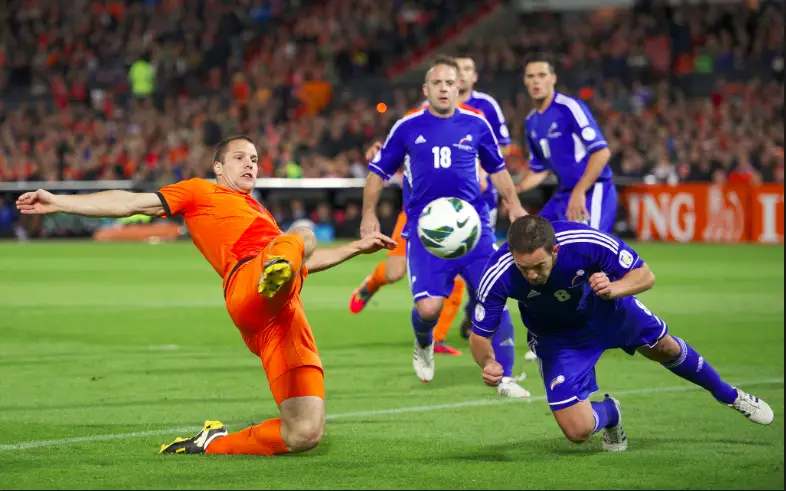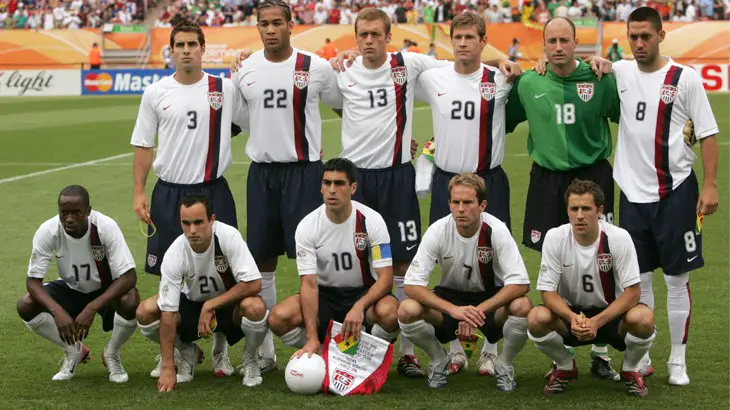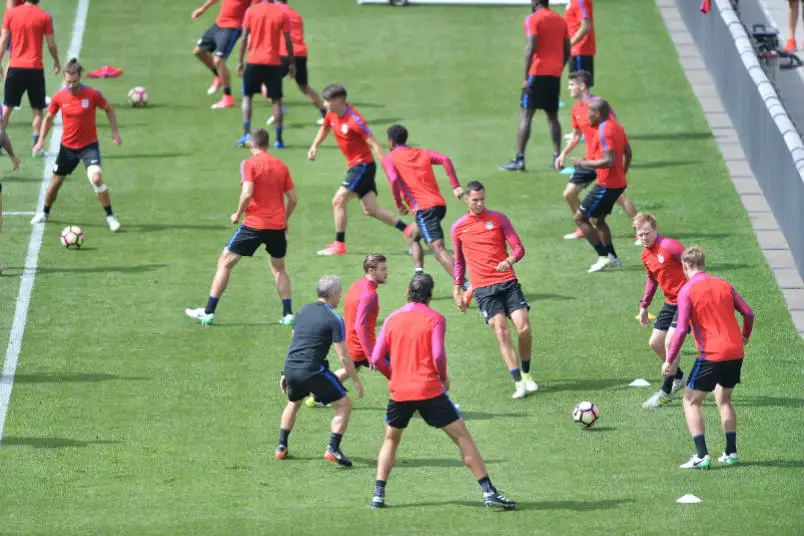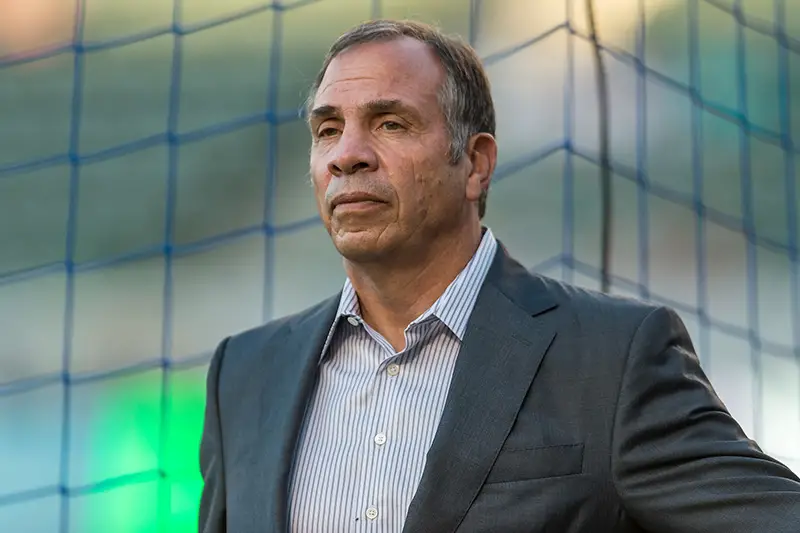Soccer has always been an acquired taste here in the U.S. In the past, most of the enthusiasm for the world’s sport came once every four years, when the World Cup rolled around. However, after the patriotic fervor wore off, with the inevitable U.S. exit from the competition, soccer fandom has often died down with it.
The MLS had trouble developing a niche following, and couldn’t compete with the dominant leagues of the NBA, NFL and MLB. While soccer is a way of life for so many countries across the world, here in the U.S., it seemed more like something to keep your kids occupied. (It is, as a workout, one of the more physically trying sports on the planet, and a great way to exhaust energy-laden adolescents. For proof, check this out.)
Today, that narrative is no longer true—soccer is here to stay in the U.S. Ever since the U.S. hosted the World Cup in 1994, popularity for the sport has soared. Despite the hosts being knocked out in the Round of 16, many Americans were exposed to some of the best talent soccer had to offer, right on their home soil. Fans were spellbound by the talent across the world.
Ever since then, European soccer has been blasted across American airwaves. The UEFA Champions League, the UEFA Europa League and the German Bundesliga became key components to Fox’s grand endeavor in Fox Sports 1. NBC even got their skin in the game by signing a contract with the English Premier League. But with this window into the world of soccer, many began to wish that the U.S. would have a league with the same kind of star power that was seen in Europe.

The demand for excellence led to the rise of the MLS. Old European greats like David Beckham, Andrea Pirlo, Kaka, David Villa, Didier Drogba, Steven Gerrard and Thierry Henry moved out west, and the best American players like Tim Howard, Jozy Altidore, Clint Dempsey and Michael Bradley returned home from Europe, allowing for a massive ESPN/Fox TV contract and expansion within the MLS. That being said, the popularity of European soccer and the explosion of the MLS wouldn’t have been possible without the success of the U.S. Men’s National Team, especially with the golden age of the early 2000s.
Behind most of that success was head coach Bruce Arena. In 1998, Arena took over a directionless team. By 2002, he had forged a real winner. The Americans impressed in the 2002 World Cup, advancing in the group stage after beating a prolific Portuguese team and drawing against the South Korean hosts. After an incredible two-zero victory against hated rivals Mexico in the Round of 16, the U.S. made it to a quarterfinal match against Germany. Unfortunately, the Americans’ best World Cup run since 1930 was cut short due to a Michael Ballack header and a zero-one loss to Germany.
Four years later, it seemed like Arena would take the U.S. to new heights. After a surprising run in the 2002 World Cup, the U.S. was entering the 2006 World Cup as the fourth-ranked team in the world, the highest ranking in U.S. history and a legitimate dark horse. To fans’ disappointment, the U.S. only scored twice in three games and finished last in their group. The exit was so humiliating for U.S. soccer that the U.S. Soccer Federation fired Arena, despite the fact that his team won the most games in U.S. Men’s Soccer history.

From there, U.S. Men’s Soccer fell off a cliff. After two uninspiring tenures with head coaches Bob Bradley and Jurgen Klinsmann, the U.S. dropped from fourth in the rankings in 2006 to thirty-fifth in 2017. Bradley’s team often played down to their competition and never packed a punch; Klinsmann’s team were inexperienced and inconsistent.
Bradley, Arena’s former assistant, always seemed like a place holder. Despite having success in CONCACAF with a two-one victory over Mexico in the 2007 Gold Cup title and a second-place finish in the 2009 Confederations Cup, Bradley’s team faltered when it mattered the most. In the 2010 World Cup, the U.S. stumbled to a first-place finish in a weak group featuring Algeria, Slovenia and a toothless England squad, and was immediately outed by Ghana in the Round of 16. By 2011, Bradley was out, as the U.S. found a man who was supposed to lead the Americans to future greatness, Jurgen Klinsmann.
Klinsmann, the former German great, immediately attracted attention and international prospects to the U.S. squad. Klinsmann’s tenure started off strong in 2012, with the best winning percentage in a calendar year in history, including notable victories over Mexico and Italy. With all of that, and a fun run through the 2014 World Cup, when the U.S. survived the “Group of Death” and gave dark horse Belgium a run for their money in the Round of 16, Klinsmann was canned by 2016. It was a shock for most fans, who believed Klinsmann could create a similar amount of international success that he had when coaching Germany from 2004-06.
This brings us back to Arena. For the U.S. Soccer Federation, Klinsmann was an experiment—Arena brings back a sense of comfort. The hope is that the ol’ gaffer can return American soccer to its glory days. Boy, does he have his work cut out for him.
Klinsmann did leave behind a bevy on young talent. Giant defender and World Cup hero John Brooks and wonder kid Christian Pulisic have quickly become young stars in two of the best clubs in the German Bundesliga. Brooks and Pulisic, along with Jordan Morris, Gyasi Zardes, Darlington Nagbe and Kellyn Acosta, give the U.S. a young foundation. However, with the aging American core, the kids have to grow up fast. The players that made Klinsmann’s U.S. squad so exciting are aging quickly, and they won’t be around forever. Clint Dempsey is thirty-four, Tim Howard is thirty-eight, Jermaine Jones is thirty-five—there’s no guarantee any of them will make the 2018 World Cup squad.

Time is running out for the young and the old on the U.S. squad to learn to click. The World Cup is a year away and thus far, the U.S. has struggled to qualify, with only eight points in six games. In their current position, the U.S. is third in CONCACAF, which is enough for qualification, but still only one point ahead of fourth-placed Panama.
First, Arena must assess whether he can lean on his tested vets to get the U.S. through their final stretch of qualification, and it may be necessary for the American squad’s success. Michael Bradley is the team’s rock in mid field and an inspiring captain, and Dempsey is the only consistent striker, while Howard is still significantly better than backup Brad Guzan. The young guys have loads of potential, but Arena needs his vets on the roster if they’re going to make real noise.
That being said, the most important problem Arena must solve is what exactly Pulisic is bringing to the table. The eighteen-year-old phenom represents the “chosen one” for American soccer. At his ripe young age, Pulisic started for one of Europe’s biggest club in Borussia Dortmund in the Bundesliga, as well as in Europe’s biggest tournament, the Champions League.
He has the dazzling skill and ferocity up there with Europe’s greatest young stars, he has a killer instinct that always pushes him to be better and, for once, this young great talent isn’t Brazilian or Spanish or English or French; Pulisic calls Hershey, Pennsylvania, home. With a combined forty-nine goals in the U.S. U-15 and U-17 squads, in addition to seven goals in just sixteen senior appearances, the kid looks like he has the tools to be the greatest American player ever—if only Arena can harness his monumental potential.
Arena has a lot of work still to do. The U.S. team must find a direction, and quickly. Success could mean the best American squad yet; failure could result in a team floating in obscurity and an early exit for the classic American coach.

















